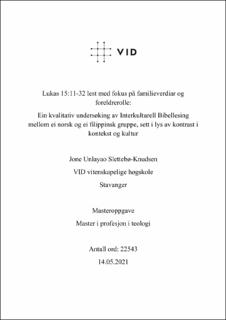| dc.contributor.author | Slettebø-Knudsen, Jone Unlayao | |
| dc.date.accessioned | 2023-04-11T08:37:38Z | |
| dc.date.available | 2023-04-11T08:37:38Z | |
| dc.date.issued | 2021-05 | |
| dc.identifier.uri | https://hdl.handle.net/11250/3062286 | |
| dc.description | Master's thesis in theology. VID Specialized University, Stavanger, May 2021 | en_US |
| dc.description.abstract | Heilt inn i vår tid har Europa vore eit sentrum for teologisk utvikling, og tanken var, særleg under kolonitida, at berre den europeiske vestlege tradisjonen kunne føre fram sann teologisk kunnskap. Denne tanken har i nyare tid vorte utfordra av ei verd som stadig vert meir og meir globalisert gjennom nye formar for transport, kommunikasjon og vitskap. Inn i den nye tida har Europa og vesten sitt tilnærma monopol på «god teologisk kunnskap» vorte brote ned, og som eit resultat har det teologiske tyngdepunktet vorte meir utydeleg. Ut i frå denne utviklinga har ein ny form for postkolonial bibelesing sitt utspring, nemleg den interkulturelle bibellesinga. Denne forma for bibelesing, der bibel og kulturell kontekst møtes, har ført til ein myriade av nye tolkingar som kaster nytt lys på gamle bibeltekster.
I 2001 vart det starta eit prosjekt rundt interkulturell bibellesing av den Nederlandske professoren Hans De Wit. Det spesiell med dette prosjektet var ikkje at lesarar frå forskjellige kultur og kontekst vart spurde om å delta.1 Eigenarten hadde heller ikkje sitt grunnlag i at det var «vanlege » lesararar som tok del. Innovasjonen var å finne i at avstand vart innført som ein hermenautisk faktor og at dialog vart innført mellom partar frå forskjellige tolkingstradisjonar og kontekst. Målet med prosjektet var å finne ut av kva som skjer når menneske med svært forskjellig kontekst og kultur, leser den same bibelteksten og starter ein dialog rundt den sin tyding. Prosjektet resulterte i at deltakarane vart bevist på si eiga og «den andre» si tolking av bibelteksten.
Denne oppgåva vil forsøke å finne fram til kva som skjer når to grupper av «vanlege» lesarar, ei norsk og ei filippinsk, les teksten om den bortkomne sonen i Lukas 15:11-32 saman. Korleis snakkar og samhandlar dei to gruppene med kvarandre på tross av forskjellig kontekst og kultur, og vil møtet føre til ein felles transformasjon av tolking og praksis som kaster nytt lys på teksten og livet? | en_US |
| dc.description.abstract | From olden days and all the way up until our times Europe has been a centre of theological development, and the thought was, especially under colonial times, that only the European western tradition could maintain true theological knowledge. This thought has been challenged throughout modern times by a constantly more globalized world and through the invention of new forms of transportation, communication and science. Europe and the West has within this new era lost its monopoly as the only source of “good theological knowledge”, and as a result the theological centre of gravity has become more indistinct. From this development a new form of post-colonial bible reading was created. Intercultural bible reading. This new form of bible reading, where the Bible and the cultural contexts meet, has led to a myriad of new interpretations, which casts new light onto old Bible texts.
In 2001 a project on intercultural bible reading was started in the Netherlands by the professor Hans De Wit.2 The project was not special in the way that the participants was from different cultures and context. Neither was the project special in the way the participants were “ordinary readers” of the Bible, with no theological education. The innovation was to be
found in the fact that distance was introduced as a hermeneutical factor, and dialogue was introduced between groups with different interpretive traditions and contexts. The goal of the project was to research what happens when people with radically different context and culture reads the same Bible passage and starts a dialogue about its interpretation. The project resulted in a transformation of some of the participants as they became aware of the own
biblical interpretation and the interpretation of “the other”.
This thesis will try to describe what happens when two groups of “ordinary readers” of the
Bible, one Norwegian group and one Philippino group, reads the text about the prodigal son in Luke 15:11-32, asking: how does the two groups talk and behave with each other despite their contextual and cultural differences? Will their collaboration lead to a transformation of interpretation and praxis that will shed new light upon the text and their life? | en_US |
| dc.language.iso | nno | en_US |
| dc.subject | bibellesning | en_US |
| dc.subject | interkulturell kommunikasjon | en_US |
| dc.subject | hermeneutikk | en_US |
| dc.subject | Bible reading | en_US |
| dc.subject | hermeneutics | en_US |
| dc.subject | intercultural communication | en_US |
| dc.title | Lukas 15:11-32 lest med fokus på familieverdiar og foreldrerolle : Ein kvalitativ undersøking av Interkulturell Bibellesing mellom ei norsk og ei filippinsk gruppe, sett i lys av kontrast i kontekst og kultur | en_US |
| dc.type | Master thesis | en_US |
| dc.description.version | submittedVersion | en_US |
| dc.rights.holder | Forfatteren har opphavsrettighetene til rapporten. Nedlasting for privat bruk er tillatt. | en_US |
| dc.subject.nsi | VDP::Humaniora: 000::Teologi og religionsvitenskap: 150 | en_US |
| dc.source.pagenumber | 84 | en_US |
